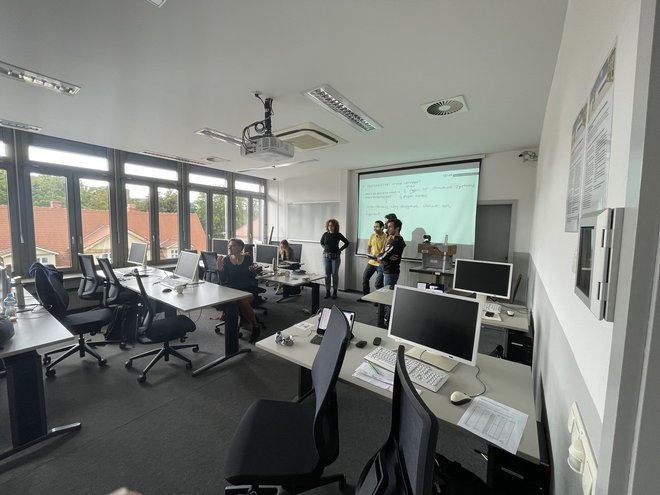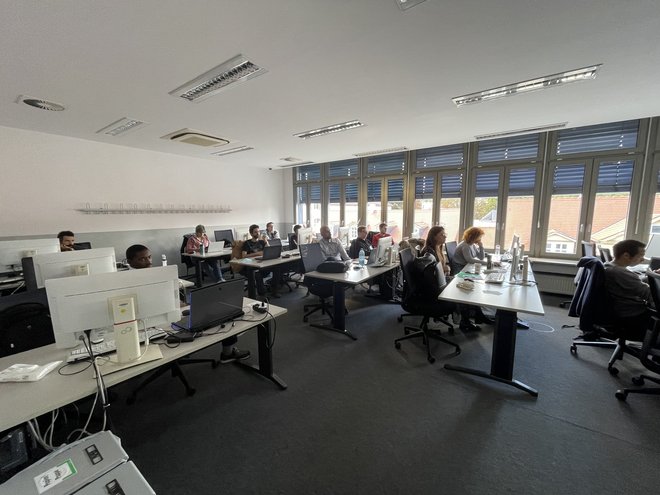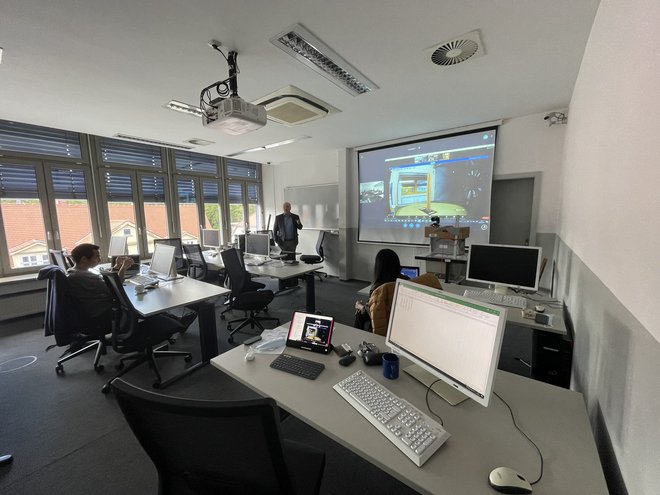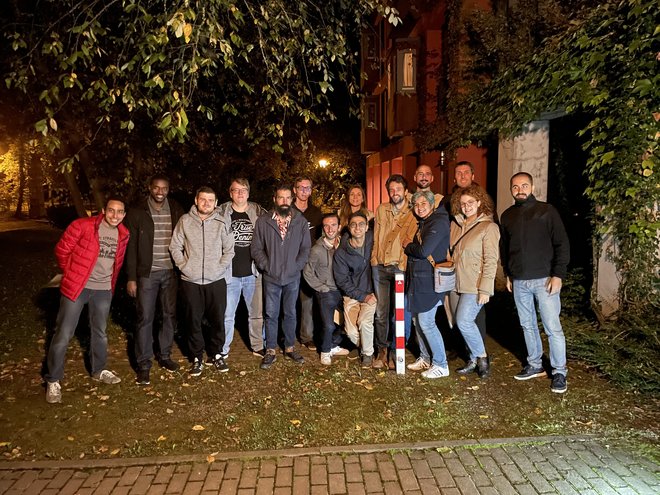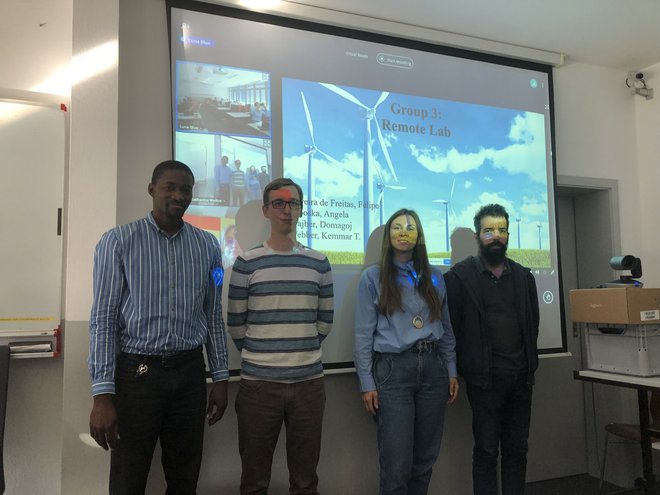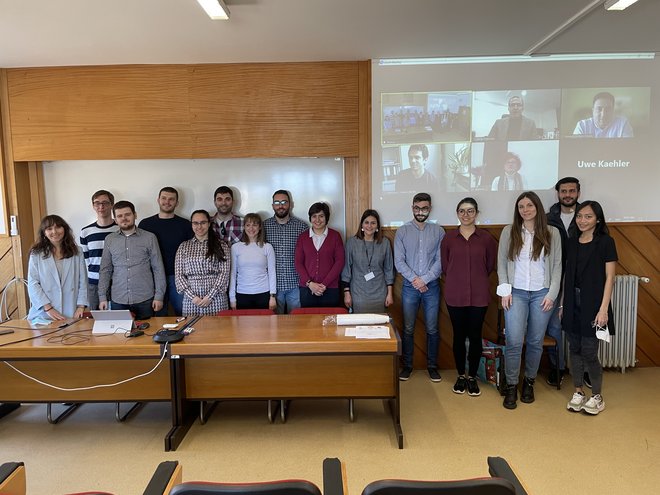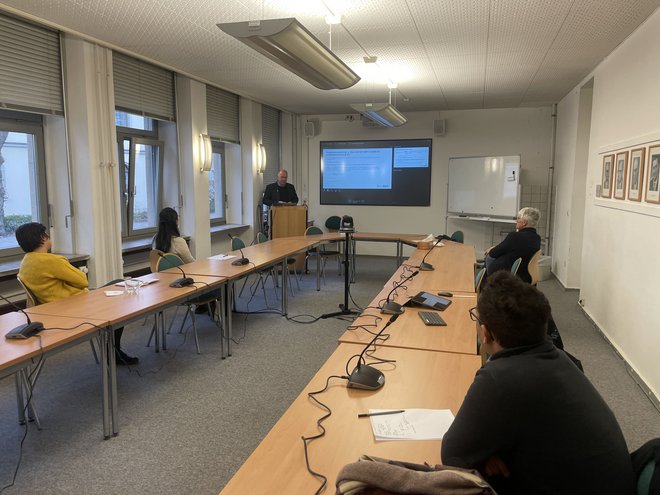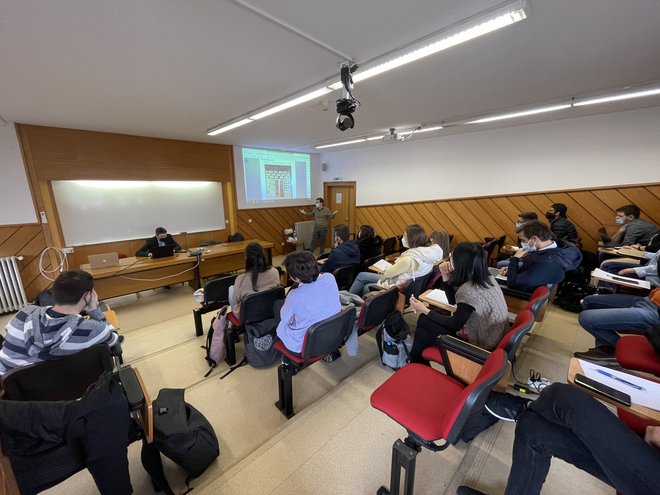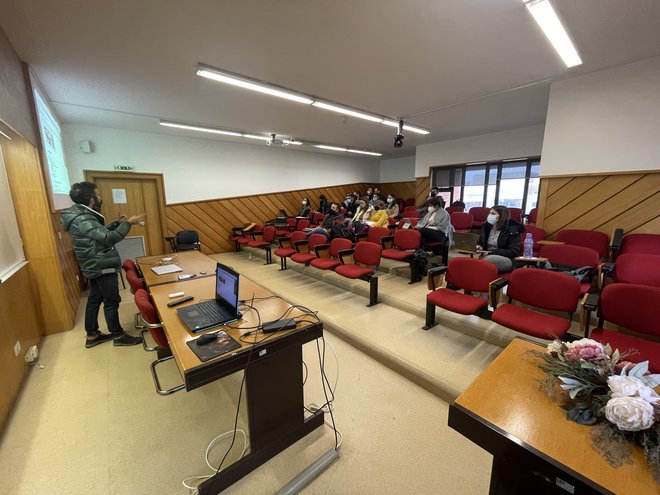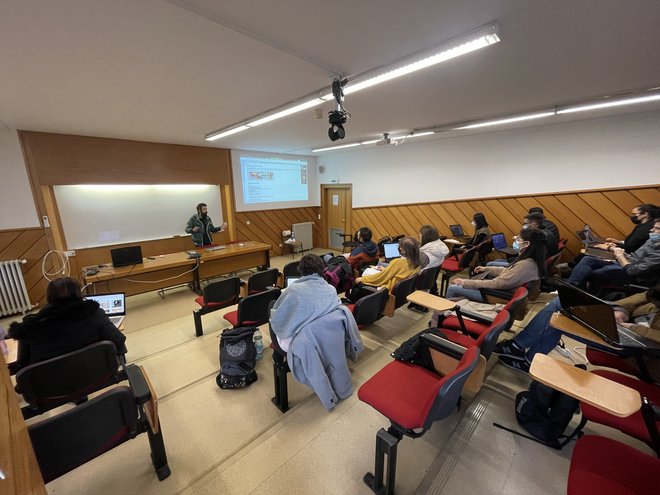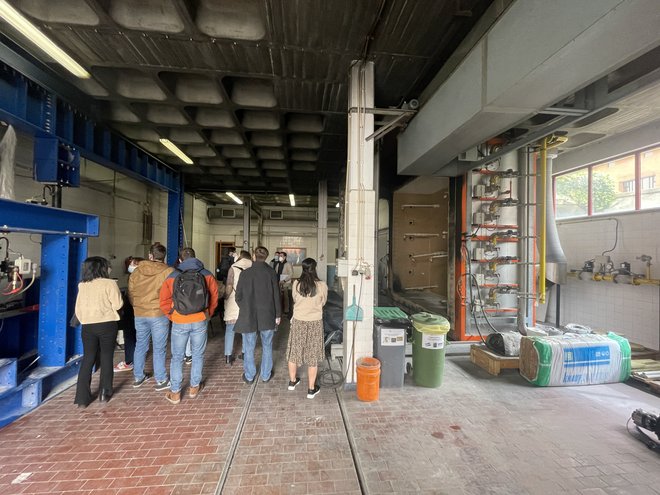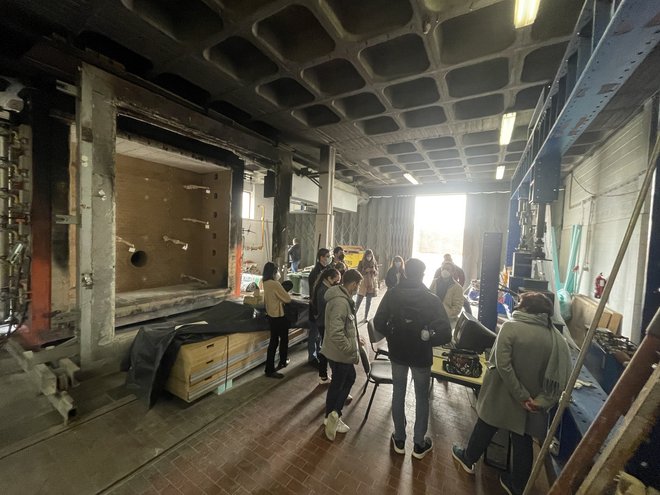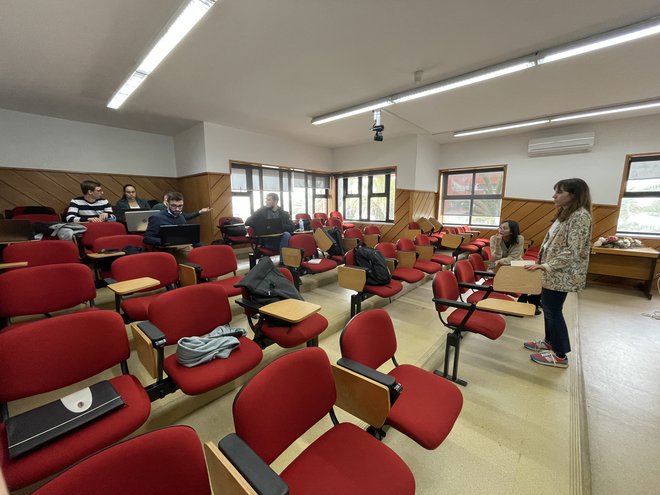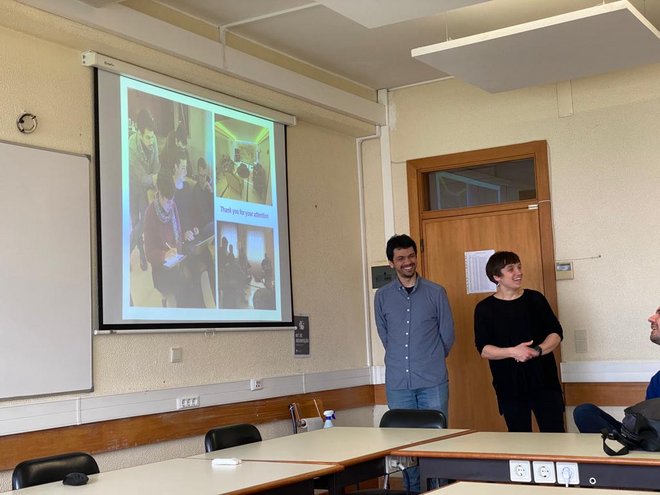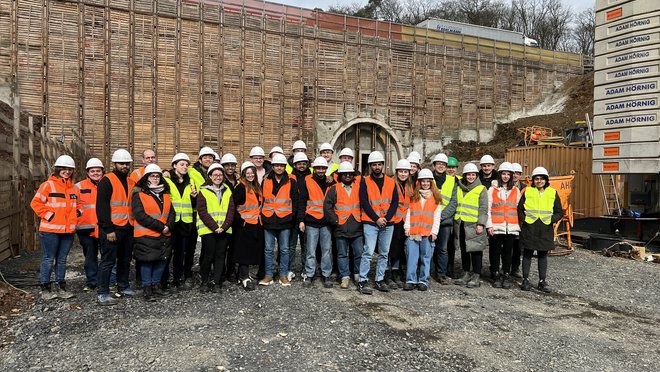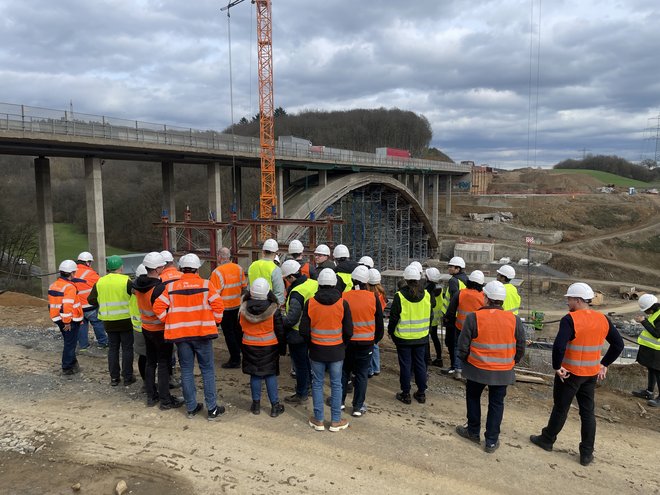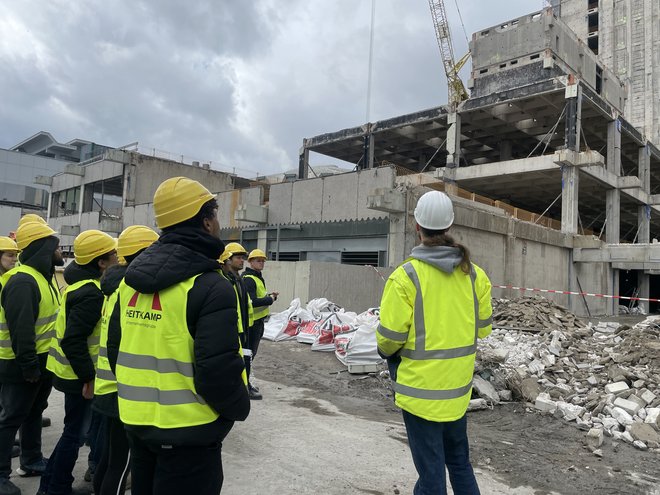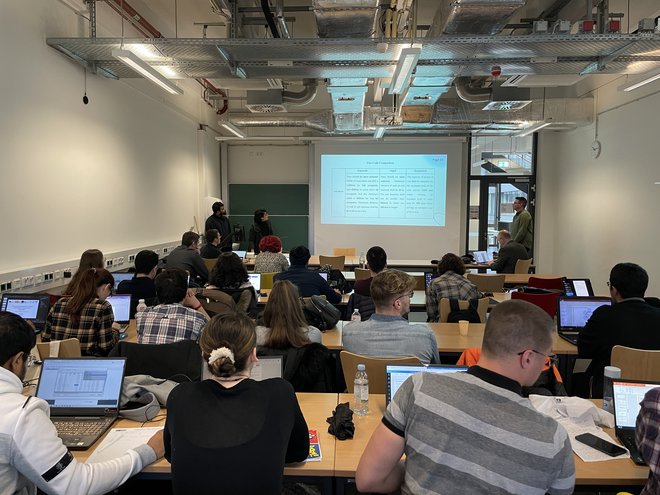Teaching Activities
Learning and teaching activities were organized as part of the project. First, an E-tutor training course was conducted at Bauhaus-University in Weimar. This course aimed to provide lecturers with didactic principles and digital tools to support the development and implementation of e-learning scenarios. Furthermore, an advanced training course in Aveiro (PT) was divided into an online part and a one-week hybrid part (which was conducted twice, once in 2022 and once in 2023). The project also involved an international elective blended course “Pilot course” module for structural engineering M.Sc. students, designed to serve as an example of collaborative teaching and learning, where the project's achievements were implemented and tested.
The innovative approach taken in this project, which combined virtual technology, remote laboratories, and interactive teaching methodologies, has wide-reaching potential for scalability and cross-disciplinary adaptation. Its successful implementation in civil engineering education shows promise for its application in other engineering fields. The method allows for international experience exchange, first-hand expert knowledge transfer, and global interconnectivity, enhancing the overall quality of learning experiences. This approach can revolutionize the traditional educational model in diverse areas.
- E- Tutor Training Course
- PhD - Course 2022: Aveiro, Portugal
- PhD - Second training Course 2023: Aveiro, Portugal
- Ms.c. Pilot Course
E-Tutor Training Course

September 27th to 1st October, 2021 at Bauhaus-University, Weimar
In cooperation with the eLearning Lab “eLab” of BUW, and support from the project partner Ruhr University Bochum (RUB), the project coordinator Bauhaus-University Weimar (BUW) organized and implemented a training course in digital tools, as well as possible application scenarios in teaching including a comprehensive overview of the possibilities and offers of eLearning and Moodle functionalities.
The following topics were adressed:
- Making an educational movie with low budget and high effect;
- Media didactics and media concept for e-learning and e-teaching: story telling, media usage and concepts;
- Moodle environment and online examination;
- Remote access experiments: Structural Health Monitoring of a Wind Turbine.
The course served for the training of e-tutors for the technical support and implementation of different learning media within the project PARFORCE and beyond that in the context of further consolidation at the partner universities, an eTutor will be a student assistant who supports lecturers in creating digital content for their courses. The tutor training provided theoretical knowledge about e-learning tools, methods, techniques as well as hands-on training by working on individual project ideas designed by participating lecturers. The mutual exchange between eLAB, lecturers, and eTutor was successfully established for the implementation of the knowledge taught during the training into real teaching scenarios, successful materials were elaborated and distributed, participants of the training to be well equipped and prepared for future tasks within the project. Furthermore, the exchange within the training enables the eLAB-team to design future training according to the student's and lecturer's needs, based on experience gained within the framework of the training.
Participants output from the training
Object learning with interaction: Build a bridge using paper
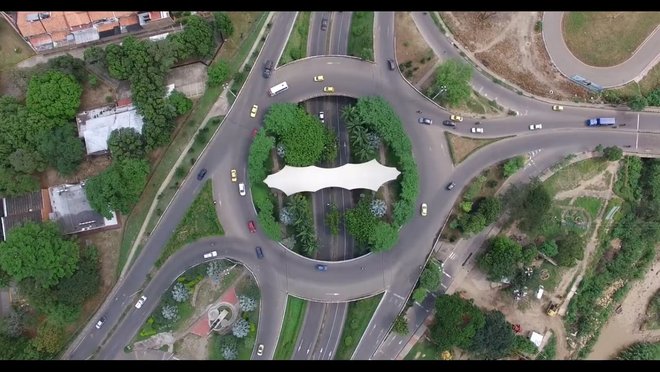
Object learning with interaction: Build a bridge using paper
from Project PARFORCE
Click the Play button to load and view external content from Vimeo.com.
Automatically load and view external content from Vimeo.com (You can change this setting at any time via our »Data protection policy«.)
Monitoring and basic data analysis: Example of remote access experiment of a wind turbine using web application

Monitoring and basic data analysis: Example of remote access experiment of a wind turbine using web application
from Project PARFORCE
Click the Play button to load and view external content from Vimeo.com.
Automatically load and view external content from Vimeo.com (You can change this setting at any time via our »Data protection policy«.)
Documentation of real objects: Masonry wall elements
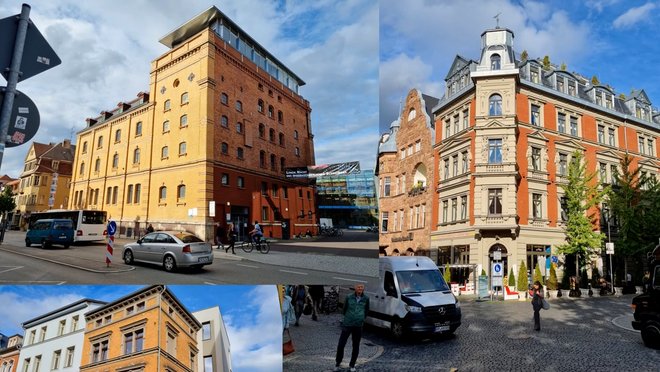
Documentation of real objects: Masonry wall elements
from Project PARFORCE
Click the Play button to load and view external content from Vimeo.com.
Automatically load and view external content from Vimeo.com (You can change this setting at any time via our »Data protection policy«.)
Ph.D. Training Course 2022: Applied and Computational Mathematics in Engineering Application

Course 2022: Aveiro, Portugal | The course focus on: Inverse problems, Signal processing (analysis of monitoring data, pre‐processing of acquired data), Bayesian statistics, Machine learning methods based on reproducing kernels, Artificial neural networks, and deep learning.
Course Description
Given that new paradigms such as deep learning and explainable AI are increasingly permeating quantitative studies, parameter identification, and pattern recognition demands on PhD students are growing with the complexity of research topics and application requirements. Unfortunately, current developments in these fields are fast and cannot be easily incorporated into standard courses in Engineering or in individual courses by partner institutions. Therefore, there is a common need and high demand for specialized training courses on these topics.
To address these issues in the framework of the PARFORCE project, special training courses are carried out At the University of Aveiro, Portugal by using a blended teaching approach with the ultimate goal to create online courses, while allowing to bundle resources and expertise to impart knowledge in a very comprehensive and goal‐oriented way and providing students with the opportunity to create their own networks in a European environment.
Conduction of the course
The course was divided into two parts: An online part which took place between (21st February – 10th March 2022) with two lectures per week, and a one-week hybrid part which took place (14th to 19th March, 2022), where selected number of students traveled to Aveiro, Portugal and were taught in a classic presential environment while a second group followed the lecturers online. This allows using these courses as a testbed for a comparison between online and in-class training and teaching methods. To this end, the online part of the course were given by a combination of synchronous and asynchronous training to boost students’ background for the hybrid part which can then be efficiently used for the project work and discussion/reflection of knowledge. Furthermore, participants composed of a combination of students from civil engineering with different specializations as well as students from Mathematics. This allows them to follow teaching activities and project work in form of interdisciplinary teams and to experience modern scientific knowledge in realistic training settings.
Participating students worked together on realizing of civil engineering experiments in a virtual environments, the first project involved a force vibration experiment on the multistory RC frame structure to investigate its dynamic properties, here students recorded a real experiment with 360 cameras, and created a virtual video with scientific information regarding setup, procedure and analaysis of obtained data in a VR environment, participants also contributed with a virtual tour of the experiments setup. (VR tour)
The second project involved fire resistance experiments, the virtual experiment created by the participants aims at teaching students different procedures for testing fire resistance, integrity, and insulation, as well as understand their differences in terms of testing systems. Based on the results of the experiment, the student should be able to determine the fire resistance classification of the tested specimen. Students should know the difference between the resistance (R), integrity (E), and insulation (I) requirements (MRI) in order to accurately identify a specimen, according to EN 13501-2. Furthermore, students should understand how to classify a system when its resistance, integrity, and insulation are not the same (e.g., if the class of the integrity of the system is E90, but the insulation falls into class 60, the whole system is classified according to the less favourable criteria, i.e., EI60).
Student learning outcomes
- Participants were taught:
- to choose and implement correct regularization algorithms for a given inverse problem;
- to pre-process (denoising/deblurring/etc.) and analyze experimental data;
- to evaluate the quality of numerical methods/algorithms for a given mathematical model, make a correct choice and be able to choose the correct method in commercial programs;
- to analyze errors and their propagation in mathematical models;
- to implement and train a machine learning algorithm;
- to setup and properly train an artificial neural network.
- Students had the opportunity to work in an international environment with students from 4 different countries and practice their management, presentation, and language skills
Ph.D. Training Course 2023: Applied and Computational Mathematics in Engineering Application

Course 2023: Aveiro, Portugal | The course focus on: Inverse problems, Signal processing (analysis of monitoring data, pre‐processing of acquired data), Bayesian statistics, Machine learning methods based on reproducing kernels, Artificial neural networks, and deep learning.
Course Description
Given that new paradigms such as deep learning and explainable AI are increasingly permeating quantitative studies, parameter identification, and pattern recognition demands on PhD students are growing with the complexity of research topics and application requirements. Unfortunately, current developments in these fields are fast and cannot be easily incorporated into standard courses in Engineering or in individual courses by partner institutions. Therefore, there is a common need and high demand for specialized training courses on these topics.
To address these issues in the framework of the PARFORCE project, special training courses were offered At the University of Aveiro, Portugal by using a blended teaching approach with the ultimate goal to create online courses, while allowing to bundle resources and expertise to impart knowledge in a very comprehensive and goal‐oriented way and providing students with the opportunity to create their own networks in a European environment.
Conduction of the course
The course was divided into two parts: An online part which was held between (13st February – 24th February 2023) with two lectures per week, and a one-week hybrid part which took place (6th to 10th March, 2023), where selected number of students travel to Aveiro, Portugal and were taught in a classic presential environment while a second group follows the lecturers online. This allows using these courses as a testbed for a comparison between online and in-class training and teaching methods. To this end, the online part of the coursewas given by a combination of synchronous and asynchronous training to boost students’ background for the hybrid part which can then be efficiently used for the project work and discussion/reflection of knowledge. Furthermore, targeted participants composed of a combination of students from civil engineering with different specializations as well as students from Mathematics. This allows them to follow teaching activities and project work in form of interdisciplinary teams and to experience modern scientific knowledge in realistic training settings. Participating students worked together on realizing of civil engineering experiments in a virtual environments and presented their work at the end of the training. The course curriculum included training in Bayesian statistics, machine learning methods, and guest lectures from different engineering fields. The course emphasized hands-on experience, and participants worked in groups to apply the trained topics to engineering problems.
M.Sc. Pilot Course | Experimental Testing Based on Impact and Resistance: Wind, Fire and Earthquake

Introduction
Bauhaus University Weimar (BUW) - Chair of Advanced Structures took lead to organize an elective module with partner universities between Ruhr University Bochum (RUB), University Aveiro (UA), University Osijek (UNIOS), and Institute of Earthquake Engineering and Engineering Seismology (IZIIS). The pilot course was organized within the framework of the Erasmus+ strategic partnership for digital education program (2022-2023), under the project title “PARFORCE: Partnership for virtual laboratories in civil engineering”, the course will be offered by each partner as an elective module for the local students. The pilot course served as an example for collaborative teaching and learning, whereas the project achievements were applied and tested. Based on the final evaluation, the pilot course can become the basis for future implementation in the curricula of the partners study programs and shall be opened for external students keeping recognition and inscribing rules of the partners, participating students will got the chance to attend civil engineering experiments related to the course content in a virtual environment and visit constcution site throughout Germany.
Course Description
Participating students familiarize with principles of the design and setup, as well as evaluation and interpretation of experimental testing in structural engineering, by attending the experiments in a virtual environment. The studentsapplied their theoretical knowledge and competences for solving complex practical tasks, and thus, building their own “mental models”, the focus on the special and diverse demands in the elaboration of repeatable and destructive testing.
Students got the chance to work with methods and instrumentation requirements to provide structure related parameters and characteristic e.g. force-displacement relationships in support of analytical studies. Students decided upon appropriate test configuration for particular problems and to formulate the right questions in preparation of experimental studies. The attending participants worked in international teams composed of students from each partner on a collaborative project, students were trained in distant group work.
Project Description | Assessment of Structures under Wind, Fire, and Earthquake
The fact that earthquakes, as well as winds, exert lateral forces on buildings invites a comparison between the two. Suffice it to say that although earthquakes and winds produce dynamic forces with distinctly different characteristics, approximated by static loadings in the simplified approaches usually adopted in building design codes. It is generally recognized that the two forces need not be considered simultaneously; ascertaining the necessity of determining the governing lateral load provisions in any given design problem where both apply. A comparison of this sort, however, is valid only for one particular set of conditions and may fail to reveal the effects of certain important variables (e.g. geographic location) on the relative importance of earthquake and wind on a country wise basis.
The aim of this project is to introduce the participants to the field of earthquake and wind engineering, starting with the study of code requirements and their application to different structural systems. The structural performance for different levels of seismicity and wind-speed will be evaluated using modern software. During the project, various modelling techniques and analysis methods will be demonstrated. Different modeling assumptions (e.g., material parameters) and modifications of the structural layout (e.g., irregularity in elevation) should be considered while evaluating its influence on the dynamic behavior. After the project, the participants should be able to model and analyze structures using standard procedures. In addition to the evaluation of the structural performance for wind and seismic loads, students are asked to elaborate on a comparative fire safety concept with regards to the occupant’s evacuation time. At the end, a small presentation should be prepared by the participants in order to discuss the results.
More information regarding the course project can be accessed here ...
Course Schedule
The course will be divided into two parts, a hybrid part where local students might attend the classes face-to-face, and participating students from other partner universities will attend the class online, this phase will start on 12th october 2022. The hybrid phase is followed by a one-week presence part, where all students and responsible lectures will meet in Germany for one week. The face-to-face meeting is assigned to discussion/reflection of knowledge, team building, presentation and working on the project assignments, visiting of construction sides in further support of training competencies. the complete course schedule can be viewed here...
Finally, the participating students were taken on excursions to the A45 replacement project for the Bornbach and Bechlingen viaducts. Here, engineers and supervisors provided a brief presentation of the project, followed by a tour of the construction site. Additionally, during the presence phase of the course, a specialized course in scientific practices was delivered by a team from Bauhaus University to improve the writing and presentation skills of the students. The participating students got the chance to present their work and final outcomes of the course.



